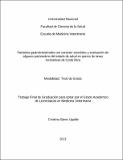| dc.contributor.advisor | Jiménez Rocha, Ana E. | es_ES |
| dc.contributor.author | Sáenz Ugalde, Cristina | es_ES |
| dc.date.accessioned | 2016-04-27T14:01:53Z | |
| dc.date.available | 2016-04-27T14:01:53Z | |
| dc.date.created | 2013 | es_ES |
| dc.date.issued | 2013-06-05 | es_ES |
| dc.identifier.uri | http://hdl.handle.net/11056/12937 | |
| dc.description | Modalidad: Tesis | |
| dc.description.abstract | El estudio se llevó a cabo con el objetivo de determinar las especies y los porcentajes
de infección de parásitos gastrointestinales (PGI) zoonóticos, así como evaluar algunos
parámetros de salud (físicos y hematológicos) con la presencia de PGI, en perros que
visitan áreas recreativas de Costa Rica. Se recolectaron muestras de heces y sangre de
perros con y sin dueño, durante la época lluviosa (julio a noviembre 2011). Las muestras
de heces fueron procesadas por la técnica de Sheather y el Directo Salina-Lugol, y a las
muestras de sangre se les realizó un hemograma completo. A cada animal se le efectuó un
examen objetivo general, y a los propietarios de las mascotas se les aplicó una encuesta
con datos del animal y de control antiparasitario. Se identificaron cinco PGI zoonóticos y
sus respectivos porcentajes de infección fueron 87,9% ancylostomatídeos, 16,9% Trichuris
vulpis, 10,8% Giardia duodenalis, 6,0% Toxocara canis y 1,2% Dipylidium caninum. Las
áreas recreativas con mayor porcentaje de infección a PGI fueron el Parque Central de
Cañas, Guanacaste (60,7%), el Parque Asís Esna/Vargas, Limón (53,8%) y el Parque del
Agricultor, Alajuela (50%). Las infecciones simples fueron las más frecuentes (76,7%). El
71,4% y el 86,0% de los animales tuvo una condición corporal buena y membranas
mucosas rosadas, respectivamente. El 60,1% de los animales presentó alteraciones
hematológicas (anemia y/o eosinofilia). La encuesta aplicada determinó que el 68,6% de
las mascotas no había tenido historia de PGI pero sí de pulgas (69,7%), y que la vía tópica
fue la forma de desparasitación más frecuente. Se encontró asociación significativa de la
coloración de las membranas mucosas (p = 0,04) y de la eosinofilia (p = 0,005) con la
presencia de PGI. No así para condición corporal (p = 0,22), el sexo (p = 0,54), la raza (p
= 0,20), la edad (p = 0,82) y el uso de tratamiento antiparasitario (p = 0,90). | es_ES |
| dc.description.abstract | In order to determinate the species and the infection rates of zoonotic gastrointestinal
parasites, as well as to evaluate some physical and hematological parameters with the
presence of parasites, was carried out a study in dogs from recreational areas of Costa
Rica. Fecal and blood samples were collected from street and housed dogs, on rainy season
(July to November 2011). The feces samples were processed by direct smear method with
saline-lugol´s solution and fecal flotation technique. For each animal was performed a
complete haemogram and physical examination. A questionnaire was applied for pet’s
owners to know animal data and antiparasitic control. Five zoonotic gastrointestinal
parasites were identified: Ancylostomatidae (87,9%), Trichuris vulpis (16,9%), Giardia
duodenalis (10,8%), Toxocara canis (6,0%) and Dipylidium caninum (1,2%). The Cañas
Central Park (Guanacaste), Asis Esna/Vargas Park (Limón) and Agricultor Park (Alajuela)
had the highest percentage of infection of gastrointestinal parasites (GIP) (60,7%, 53,8%,
50,0% respectively). Simple infections of parasites were more frequently found (76,7%).
The 71,4% and the 86,0% of the animals had a good body condition and pink mucus
membrane, respectively. The 60,1% of the animals had some type of haematological
alteration (anemia and/or eosinophilia). The questionnaire determined that none of
domestic pets had history of gastrointestinal parasites, whereas 69,7% had fleas. The most
common form of deworming was topical way. There was a significant association with the
color of the mucus membrane (P= 0,04) and eosinophilia (P= 0,005) with presence of GIP.
Finally, body condition (P= 0,22), gender (P= 0,54), breed (P= 0,20), age (P= 0,82) and
antiparasitic treatment (P= 0,90) were not had significant association. | |
| dc.format | application/pdf | es_ES |
| dc.language.iso | es_ES | es_ES |
| dc.publisher | Universidad Nacional, Costa Rica | es_ES |
| dc.rights | Atribución-NoComercial-SinDerivadas 3.0 Costa Rica | es_ES |
| dc.rights.uri | http://creativecommons.org/licenses/by-nc-nd/3.0/cr/ | es_ES |
| dc.subject | PERRO | es_ES |
| dc.subject | PARASITOS | es_ES |
| dc.subject | ENFERMEDADES GASTROINTESTINALES | es_ES |
| dc.subject | ENFERMEDADES INFECCIOSAS | es_ES |
| dc.subject | SALUD ANIMAL | es_ES |
| dc.title | Parásitos gastrointestinales con carácter zoonótico y evaluación de algunos parámetros del estado de salud en perros de áreas recreativas de Costa Rica | es_ES |
| dc.type | http://purl.org/coar/resource_type/c_7a1f | |
| una.tesis.numero | 8196 | es_ES |
| dc.description.procedence | Escuela de Medicina Veterinaria | |


